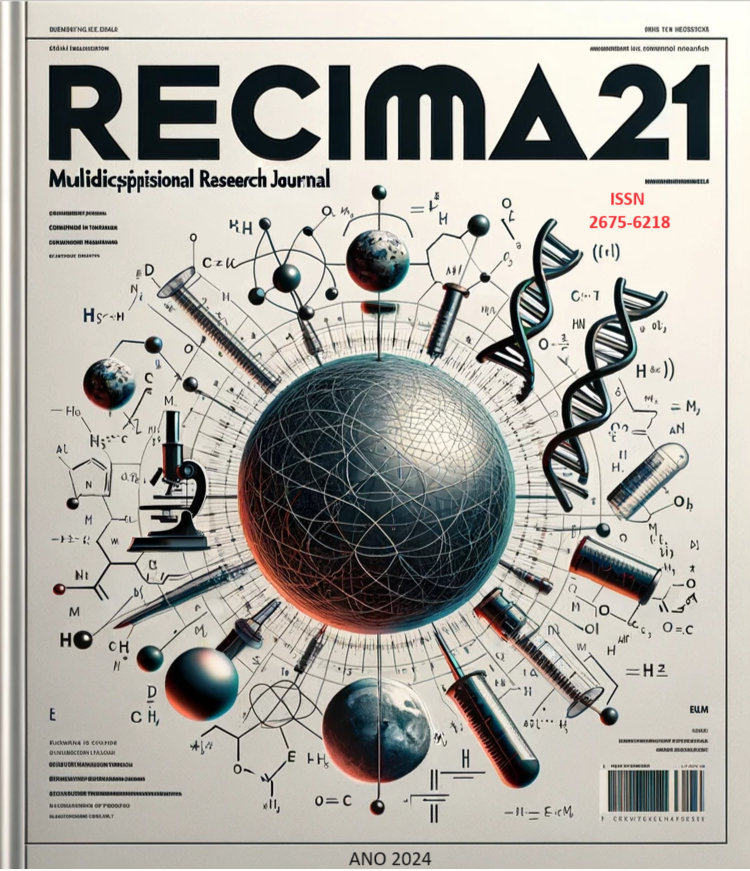GAMIFICATION AND PEDAGOGICAL PRACTICES: AN ANALYSIS OF THE LITERACY PROCESS
DOI:
https://doi.org/10.47820/recima21.v5i10.5854Keywords:
Literacy. Teaching-Learning. Gamification. Literacy.Abstract
This study considers gamification as a pedagogical resource that places the student as the protagonist of his own knowledge, stimulating the development of his school activities with regard to literacy and literacy. In this sense, the main objective of this research is to analyze gamification as a pedagogical resource in the literacy process of elementary school students. To achieve the proposed objective, this study used the descriptive research approach and as methodological procedures the bibliographic research was used. This teaching modality takes into account that each student learns in his or her own time and that each individual has his or her particularities in terms of learning. However, this educational method requires autonomy on the part of the students, because only then can they acquire the necessary protagonism. It is in this sense that gamification is placed as an alternative resource in the educational context, with the aim of making the student the center of their learning, making them the main actor of their learning. In view of the results obtained, it was found that gamification is an innovative resource that contributes to the literacy and literacy process, arousing interest, autonomy, motivation and also provides students with a more playful and dynamic learning environment.
Downloads
References
ALVES, F. Gamification: como criar experiências de aprendizagem engajadoras: um guia completo: do conceito a prática. São Paulo: Editora DVS, 2015.
BARBOSA, E. F.; MOURA, D. G. de. Metodologias ativas de aprendizagem na Educação Profissional e Tecnológica. Rio de Janeiro: Senac, 2013. v. 39. DOI: https://doi.org/10.26849/bts.v39i2.349
BRASIL. Base Nacional Comum Curricular. Brasilia: Ministério da Educação, 2018. Disponível em: http://portal.mec.gov.br/conselho-nacional-de-educacao/base-nacional-comum-curricular-bncc
BRASIL. Ministério da Educação. Secretaria de Educação Básica. Ensino fundamental de nove anos: orientações para a inclusão da criança de seis anos de idade. Brasília: FNDE, Estação Gráfica, 2006.
COTTA, R. M. et al. Construção de portfólios coletivos em currículos tradicionais: uma proposta inovadora de ensino-aprendizagem [The construction of collective portfolios in traditional curriculums: an innovative approach in teaching-learning]. Ciencia & saude coletiva, v. 17, n. 3, p. 787–796, 2012. Disponível em: https://doi.org/10.1590/s1413-81232012000300026. DOI: https://doi.org/10.1590/S1413-81232012000300026
DAROLT, V. Gamificar em Sala de Aula. Curitiba: CRV, 2021.
DEMO, P. Pesquisa Educacional na América Latina e no Caribe – Tentativa de síntese e de discussão crítica. Rio de Janeiro: Editora Universitária-UFF, 1993.
FRADE. I. C. A. da S. VAL., M. da G. C.; BREGUNCI, M. das G. de C. Métodos e Didáticas de Alfabetização: história, características e modo de fazer de professores caderno do professor. Belo Horizonte: Ceale/F a E/UFMG, 2005.
KAPP, K. M. The gamification of learning and instruction: game-based methods and strategies for training and education. [S. l.]: John Wiley & Sons, 2012. DOI: https://doi.org/10.1145/2207270.2211316
KISHIMOTO, T. M. (Org.) Jogo, brinquedo, brincadeira e a educação. 13. ed. São Paulo: Cortez, 2010.
LEAL, T. F. et al. Jogos: alternativas didáticas para brincar alfabetizando (ou alfabetizar brincando?). In: MORAIS, A. G.; ALBUQUERQUE, E. B. C.; LEAL, T. F. (Orgs). Alfabetização: apropriação do sistema de escrita alfabética. Belo Horizonte: Autêntica, 2005.
MISHRA, R.; KOTECHA, K. Envolvimento dos Alunos através da Gamificação na Avaliação Formativa Gamificante da Educação. Journal of Engineering Education Transformations, mar. 2017. ISSN 2394-1707.
MIZUKAMI, M. G. N. Ensino: as abordagens do processo. São Paulo: EPU, 1986.
SANTOS, S. M. P. Brinquedoteca: a criança o adulto e o lúdico. Petrópolis, RJ: Vozes, 2000.
SOARES, M. Alfabetização e Letramento. São Paulo: Contexto, 2015.
SOARES, M. Alfaletrar: Toda Criança Pode Aprender a Ler e Escrever. São Paulo: contexto, 2021.
SOARES, S. J. et al. O uso das TDICs no processo de ensino aprendizagem. Montes Claros: [s. n.], 2015. 10 p
SOUZA, S. E. O uso de recursos didáticos no ensino escolar. In: I Encontro De Pesquisa Em Educação, IV Jornada De Prática De Ensino, XIII semana de pedagogia da UEM: “infância e práticas educativas”. Maringá, PR, 2007.
Downloads
Published
License
Copyright (c) 2024 RECIMA21 - Revista Científica Multidisciplinar - ISSN 2675-6218

This work is licensed under a Creative Commons Attribution 4.0 International License.
Os direitos autorais dos artigos/resenhas/TCCs publicados pertecem à revista RECIMA21, e seguem o padrão Creative Commons (CC BY 4.0), permitindo a cópia ou reprodução, desde que cite a fonte e respeite os direitos dos autores e contenham menção aos mesmos nos créditos. Toda e qualquer obra publicada na revista, seu conteúdo é de responsabilidade dos autores, cabendo a RECIMA21 apenas ser o veículo de divulgação, seguindo os padrões nacionais e internacionais de publicação.













